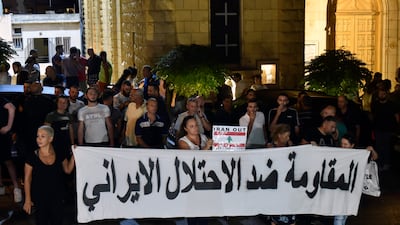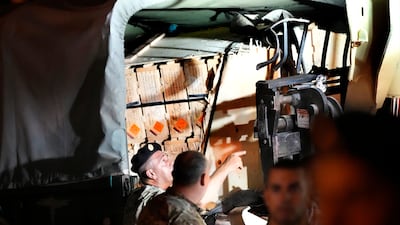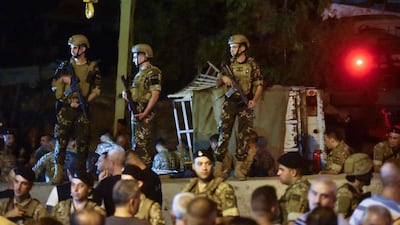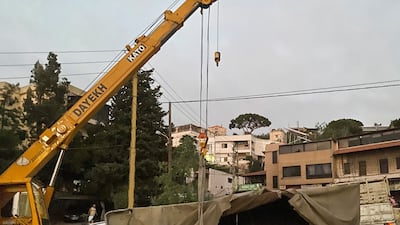Presidential divisions in Lebanon's 128-seat parliament have widened as French envoy Jean Yves Le Drian's long-awaited proposal for a cross-party dialogue was received by MPs.
It was hoped the dialogue, proposed to take place next month when Mr Le Drian returns, would help end a nine-month impasse.
A bloc of more than 30 MPs, sometimes referred to as "the opposition", said it would be "futile" to engage in a dialogue with their foe Hezbollah and its allies, which includes its Shiite Amal Movement, led by influential parliamentary speaker Nabih Berri.
Hezbollah, the only civil war-era militia allowed to keep its weapons, is often thought to be stronger than the Lebanese Army.
That opposition bloc, which includes parliament’s largest party, the Christian-led Lebanese Forces, as well as the Kataeb Party and a number of allied independents, accuses Hezbollah of maintaining a stranglehold over the country.
They have said that with the Shiite duo refusing to back down from their support for Suleiman Frangieh, their refusal to make any concessions means they are holding the election to ransom.
Hezbollah, a powerful Iran-backed Lebanese armed group and political party, gives the latter idea short shrift.
“Yes, we will attend the dialogue,” Hezbollah’s spokesman Mohammad Afif told The National.
“This confirms who is the party that rejects dialogue, disrupts the country and puts obstacles in the face of possible solutions to the economic and social crisis in Lebanon,” he added, in response to the opposition announcement that it would not attend the cross-party talks.
Tensions are high after a Hezbollah lorry carrying ammunition overturned in a largely Christian village overlooking Beirut, leading to deadly clashes between residents and gunmen escorting the vehicle.
“The opposition has taken a very bold and brave stand today,” a source from the bloc told The National, accusing Hezbollah of a policy of intimidation and delays.
In a statement, the bloc warned there was “no longer any room for wasting time”.
“The only acceptable negotiation form, within a limited time frame, is the one to be conducted by the next president soon after his election,” it said.
Mr Le Drian, the former French foreign minister, finished his second visit in his new remit at the end of July.
Opposition MPs, while welcoming his initiative, had already been cautious about his proposed dialogue. They want a return to presidential election sessions, with only two held so far this year.
In 12 parliamentary sessions, MPs have failed to find a successor to Michel Aoun, whose six-year term ended in October.
The opposition bloc had nominated MP Michel Moawad for president in the first 11 sessions, but the son of the former head of state failed to come close to the required threshold. In those sessions, Amal and Hezbollah cast blank ballots.
The Shiite duo formally announced their backing for Mr Frangieh, a close friend of Syria’s Bashar Al Assad, earlier this year.
Mr Moawad then withdrew his candidacy and – along with his colleagues in the opposition bloc – announced his support for International Monetary Fund official Jihad Azour.
Mr Berri ended the five-month voting hiatus in June, raising hopes of progress. But even after the opposition bloc came to a rare convergence with its traditional rival the Free Patriotic Movement – a large Christian party founded by Mr Aoun – they were unable to get Mr Azour over the line, when he received 59 votes compared to Mr Frangieh’s 51.
In his formal letter to MPs, Mr Le Drian said the dialogue sought to "create a climate of trust and allow Parliament to meet immediately" for successive election sessions and end the crisis.
In his letter, Mr Le Drian asked MPs what projects should be prioritised over the six years of the next president’s mandate, and what skills and qualities the next head of state should have.
Another opposition source said the bloc's statement "is a polite way" to reject attending the multiparty dialogue, though they are still expected to hold bilateral talks with Mr Le Drian.
They welcome Mr Le Drian's mediation efforts and "appreciate any endeavour that comes from friends of Lebanon. However, it has become clear that any form of dialogue with Hezbollah and its allies is futile”, the opposition statement said.
They say the opposition bloc's willingness to withdraw from its favoured candidate in Mr Moawad is evidence they have made concessions, as opposed to Hezbollah and Amal, which have refused to show any indication of stepping away from Mr Frangieh.
The dark horse in this is Gebran Bassil, the son-in-law of Mr Aoun and now leader of the FPM. A shrewd, controversial politician, it is widely believed he has designs on the presidency itself, although he appears to have accepted that that will not happen soon.
The FPM had a long-time alliance with Hezbollah, but that waned as the latter indicated its preference for Mr Frangieh.
But now there are indications that the relationship could be warming again, as more regular talks resume between the two sides. Although, as one source pointed out, he has to be careful about sensitivities within his community after the clashes last week.
Mr Bassil has suggested he could be prepared to agree on a “consensus” name if some of his requests are met, such as increased decentralisation – which may prove difficult.
According to a source close to Mr Bassil, he is insisting that "no one can impose a name on us and that we are ready to make comprises when we are given what we are asking for”.
The source said Mr Bassil was in discussion about candidates “that are not challenging to any party”, including Hezbollah.
The presidential vacuum and horse-trading associated with ending it is common in Lebanon’s deeply divided and factional political landscape.
But what is unprecedented is the state in which Lebanon now finds itself – undergoing one of the worse economic crisis in modern history, with a caretaker prime minister, no president and acting heads of its main intelligence agency and central bank.










